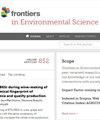作为农民,我能做些什么来减少损失?将气象信息作为应对气象灾害的退出策略的意愿
IF 3.3
3区 环境科学与生态学
Q2 ENVIRONMENTAL SCIENCES
引用次数: 0
摘要
气象信息和预报对于减少农业气象灾害非常重要。然而,生产和应用这些预报之间的差距是农民层面作物管理中最模糊的问题之一。因此,本研究的主要目的是调查影响伊朗农民使用气象信息和预测意愿的因素。为此,采用了扩展版的计划行为理论(TPB)并建立了模型。结果显示,使用气象信息和预报的态度、使用气象信息和预报的主观规范、使用气象信息和预报的感知行为控制和自我认同,以及使用气象信息和预报的道德规范变量对使用气象信息和预报的意愿有积极和显著的影响。这些变量可占气象信息和预报使用意愿变异的 46%。根据研究结果,建议通过创建多媒体程序,使农业社区认识到在其活动中使用气象信息的好处和后果。此外,还建议就气象信息在农业活动中的应用问题开展社会合作并成立研究小组。这有助于从集体角度研究使用气象信息的各个方面(优势、劣势、威胁和机遇)。在这方面做出社会决策会对个人的主观规范产生深远影响,并大大提高使用气象信息的速度。本研究的结果可以帮助农业领域的政策制定者和决策者设计合适的干预方案,使农民有效使用气象信息。同时,本研究的结果也有助于农民有效减少气象灾害的影响。本文章由计算机程序翻译,如有差异,请以英文原文为准。
What can I do as a farmer to reduce losses? Willingness to use meteorological information as an exit strategy to deal with meteorological hazards
Meteorological information and forecasts are of great importance to reduce agro-meteorological hazards. However, the gap between production and application of these forecasts is one of the most ambiguous issues of crop management at the farmers’ level. In this regard, investigating the factors influencing Iranian farmers willingness to use meteorological information and predictions was selected as the main aim of the present study. To this end, an extended version of Theory of Planned Behavior (TPB) was employed and modeled. The results revealed that attitude towards the use of meteorological information and predictions, subjective norms in the use of meteorological information and predictions, perceived behavioral control and self-identity in the use of meteorological information and prediction, and moral norm variables regarding the use of meteorological information and predictions positively and significantly affected willingness to use meteorological information and predictions. These variables could account for 46% of willingness to use meteorological information and predictions variance. According to the results, it was suggested that by creating multimedia programs, the agricultural community become aware of the benefits and consequences of using meteorological information in their activities. Furthermore, it was recommended that social cooperation and research groups be formed on the use of meteorological information in agricultural activities. This can contribute to examine the various dimensions (strengths, weaknesses, threats, and opportunities) of using meteorological information from a collective perspective. Making a social decision in this regard can have a profound effect on a person’s subjective norms and dramatically increase the speed of using meteorological information. The results of this study can help policymakers and decision-makers in the field of agriculture to design suitable intervention programs for the effective use of meteorological information by farmers. Also, the results of this study help farmers to effectively reduce the impacts of meteorological hazards.
求助全文
通过发布文献求助,成功后即可免费获取论文全文。
去求助
来源期刊

Frontiers in Environmental Science
Environmental Science-General Environmental Science
CiteScore
4.50
自引率
8.70%
发文量
2276
审稿时长
12 weeks
期刊介绍:
Our natural world is experiencing a state of rapid change unprecedented in the presence of humans. The changes affect virtually all physical, chemical and biological systems on Earth. The interaction of these systems leads to tipping points, feedbacks and amplification of effects. In virtually all cases, the causes of environmental change can be traced to human activity through either direct interventions as a consequence of pollution, or through global warming from greenhouse case emissions. Well-formulated and internationally-relevant policies to mitigate the change, or adapt to the consequences, that will ensure our ability to thrive in the coming decades are badly needed. Without proper understanding of the processes involved, and deep understanding of the likely impacts of bad decisions or inaction, the security of food, water and energy is a risk. Left unchecked shortages of these basic commodities will lead to migration, global geopolitical tension and conflict. This represents the major challenge of our time. We are the first generation to appreciate the problem and we will be judged in future by our ability to determine and take the action necessary. Appropriate knowledge of the condition of our natural world, appreciation of the changes occurring, and predictions of how the future will develop are requisite to the definition and implementation of solutions.
Frontiers in Environmental Science publishes research at the cutting edge of knowledge of our natural world and its various intersections with society. It bridges between the identification and measurement of change, comprehension of the processes responsible, and the measures needed to reduce their impact. Its aim is to assist the formulation of policies, by offering sound scientific evidence on environmental science, that will lead to a more inhabitable and sustainable world for the generations to come.
 求助内容:
求助内容: 应助结果提醒方式:
应助结果提醒方式:


